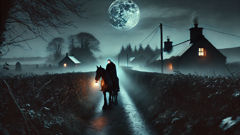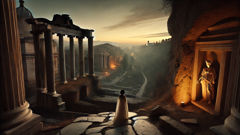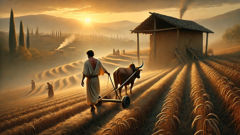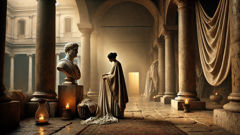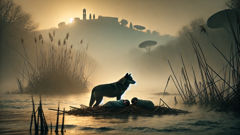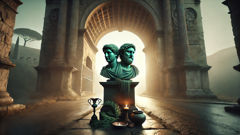Introduction
The first rumor moved like wind through oak and olive: an enormous boar had come out of the shadowed uplands above Calydon, trampling terraces, flattening barley, uprooting vines and trees. Farmers sweeping the morning dew from their flocks paused at ridgelines and watched smoke of crushed brush curl upward where the beast had passed; shepherds hurried their goats into cliffs; children were kept at hearths while women lifted jars, listening for the far-off cracking of branches. It began as a thing of weather and then gathered shape—a shape like a mountain pig with bristles like iron, eyes like coals, and a breath that steamed on the dawn. They would later say Artemis had sent it, angered by an omitted offering, the vengeance of a goddess as cold and precise as frost. Already, before the heralds rode and before the councillors convened in the stone megaron, the story sowed itself into the songs that fishermen hummed and into the prayers murmured at household shrines. When the call finally went out—by torch and trumpet, by letter and by messenger—the fields of Calydon trembled not just from the boar’s hooves but from the arrival of destiny. Men and women who would come to be known as part of the heroic age took up bronze and bow, answered the summons, and gathered beneath the shadow of the ruined acropolis. This is the story of that summons: of how a single divine offence unfurled into a hunt that tested courage, split loyalties, and left scars on the land and memory, where gods watched and mortals paid for their pride.
The Wrath of a Goddess and the Gathering of Heroes
There are moments when an ordinary life cleaves and a new story begins. For Calydon that moment came in the year after the harvest, when King Oeneus presided over his bread and wine and the household hearth. Oeneus was not a reckless man; he had held his kingdom with measured hand, hearing petitions beneath the stone lintel and sending grain to the poor. Yet when the cycle of offerings came and the village priest set the table of burns and prayers, the wine-ladle that usually poured for Artemis was left dry. Whether by oversight, by the counsel of careless men, or by the shifting priorities of an aging king, the goddess who guarded wild things and the sanctity of hunt was omitted from her place by the hearth. The slight, however tiny in mortal terms, was infinite in a god’s calculus.
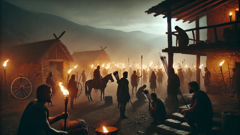
Artemis, who moves in the thin places where forest meets field, felt the absence like an arrow without a bow. She is not a goddess of compromise; she is the moon in a black sky, bright and exact. In time her judgment found form: a boar born of lightning and marsh-breathed fury that tore from the wild ravines and struck Calydon.
By the time the messengers reached the neighboring halls, the beast had made its mark. Barley floors lay trampled into mud. A stack of drying figs had become a blackened smear. An ox-cart lay overturned, splinters in a fan. Farmers, who measure their days by seed and harvest, saw their accounts twist into ruin and called for aid. The heralds rode beyond the region, and the call that rang from hilltop to hilltop was simple and terrible: “A monster ravages Calydon. Any who are heroes—claim this glory and aid the people.”
Such a summons traversed networks far older than any treaty; it touched bonds of oath and the roots of reputation. Even in an age dense with heroes, few resisted the pull of a hunt that promised peril and renown. It drew men and women who wore fame like armor—Meleager of the bloodline of Oeneus, son and heir; Atalanta, swift of foot, who had already become legend for the boar-born acts of her own past; the sons of Boreas and the Argive kin who drifted like constellations across the heroic firmament. Names gathered like clouds: Theseus whispers in some retellings; Castor and Pollux, favored sons of Leda, cross the sea in others. The hold this hunt had on the imagination of Greece made its way into the oaks and caves; poets would later take this as a theme, but the first witnesses felt only the immediate thunder of bronze and leather.
Meleager himself was complicated. Born in a house shadowed by prophecy, he was a man formed of love and fire. His mother Althaea had been told of a fatal brand at his birth, a scrap of wood whose fate and flame were tied to her son’s breath. The story of the brand is a private ghost in Meleager’s life, a promise of doom that coils behind every victorious shout. For now, his energy was outward—he prepared masks of bronze, fastened greaves, and sent for his companions. He was not merely the young prince eager to display valor; he carried the expectations of Calydon like a yoke. If the hunting party succeeded, the town would flourish; if it failed, the cost would be counted not only in crops but in shame.
Atalanta answered not for glory alone. She had already proved herself in previous mortal contests—swift, precise, a woman whose foot outran rumor. She came from Arcadia, a hunter who apprenticed among nymphs and men, wearing silence and skill as one wears armor. There is something in her that unsettles the order of courts used to measuring men’s worth by bronze and acres. When Atalanta reached the assembly, men who had once spoken only of their lineages found their voices muddled, their speech tripping over the simple fact that she moved like an arrow and knew the woods as her home.
The assembly found compromise and conflict in equal measure. Some argued for siege-works and traps; others, for a straightforward hunt. Men and women discussed tactics around braziers, throwing in shiploads of old advice: drive the beast into bogs; surround it with spearmen; turn back with nets. The unexpected presence of Atalanta and other women hunters made some voices tighten. Old rules and new impulses rubbed against each other.
In the evenings before they departed, the hunters sat by torchlight. Spears gleamed like long teeth, and corded bows sang when tested. There was a smell of frying fish, of stale wine, of hair smoothed with oil. The old singers—those who remembered names of earlier wars and older prizes—sat aloof, letting the younger men and women talk of tactics and the pressing fear of crops gone. Songs were half-remembered, and in those songs the boar was more than a beast; it was a challenge, an accusation, a test. The hunters who left Calydon the next dawn carried not only weapons but a heavy sense of being actors within a story already written by the gods.
The roads into the wild were narrow and rutted. They wound through gorges that kept the cold and clung to the sky, through oak copses where deer once grazed and now lay carcasses and torn underbrush where the boar had passed. For days the hunters tracked sign—broken branches, the deeper gouge of a hoof, tufts of mud clinging to hair. The beast left a trail like a war-path, and as they followed it, the hunters built a temporary order. Men who might have argued over wine found themselves cooperating; scouts moved ahead with horns, and the main body kept a reverent distance.
The first real sighting changed those dynamics. They found a clearing where the boar had halted to tear at the root of an oak, and the ground around it was churned into a mire of upturned earth and blood. The beast's bristles were clipped with mud; its tusks had the pale sheen of old bone sharpened by relentless grind. For a moment the hunters simply stared, each measuring distance and danger. The boar seemed to be the size of a cart, then larger; some swore they saw smoke rise from its flanks, a heat that fogged the cool air.
Atalanta moved forward first, not from bravado but precision. She set an arrow, breathed, and watched it fly like a seam of light. The shaft found flesh, and the boar answered with a wind of fury, charging with a treacherous twist. The hunt, once a test of direction and patience, became a small, violent geometry of life and death. Spears broke, shields splintered, and men slid on mud. Love and rage, youth and prophecy, braided into the moment. The battle around the beast would become the defining instance remembered in songs and odes, but it was not a single instant of triumph; it was a braided, dangerous affair where courage and folly intermingled.
The presence of the goddess hung like weather over their heads. They knew, in that aching way that mortals know the arc of a storm, that Artemis watched not from a distance but from the hollow between branches. The hunt had already been shaped by a divine hand; what the hunters could shape now were the small choices—who would strike, who would step aside, which wound would be the one that mattered. Each wound, pledge and broken promise would ripple outward from that arena and change the futures of houses and the shape of songs.
The Kill, the Gift, and the Threads of Tragedy
The hunt that unfolded has been told in a thousand variations, from short epics hummed by boatmen to lavish retellings in palaces, but certain threads remain because they are anchored by momentary truths. The boar moved like a stormfront through the woodland, driving deer before it and obliterating the quiet tracks of smaller beasts. Hunters arrayed cunning plans: drives to push it toward spears, archers on ridges to take hearts from distance, and trackers ready with ropes to bind. All of these measures changed and adapted as the beast showed its savage intelligence, throwing its weight into hedgerows or diving into bog where a man’s step might sink and become his grave.
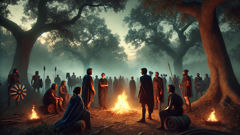
Atalanta’s arrow struck first in many accounts. It was not a mere grazed honor; the arrow bled true and deep. She, who had been trained among hunters who moved like shadow, had eyes that read trees as maps. She loosened a shaft that landed between bristle and hide; the boar staggered but did not fall. The sight of her skill unsettled some of the men—both because she was a woman whose prowess annulled an expectation of male exclusivity and because the gift of success in that culture often carried the weight of public reward. When Meleager—who had his own litany of expectations and the burden of a fate whispered to his mother—saw the boar wounded, he moved with the urgency of both prince and hunter. He lifted his spear, and by his thrust the boar, finally spent and finally mortal, collapsed amid the mud.
There it lay, breath gasping, a mass of clotted blood and broken earth. The hunters who had given chase crowded in, some eyes gleaming with victory, others reflecting a weariness that comes after danger. In the hush, the question of spoils took simple and immediate shape. The boar’s hide and the head would be emblems, both of victory and of honor. Who received them would be a visible sign: a belt, a tapestry in a hall, a boast in an ode.
Meleager had every right to claim the trophy. He had been prince and had poured himself into the effort. Yet the hunters were not merely subjects of rank; they were a community bound by deeds as well as blood. Atalanta had bled for the victory; her arrow had been the first to pierce. When Meleager took the boar’s head and passed it deliberately to Atalanta, the act was a flash of generosity and recognition. He did not merely reassign an object; he reshaped a hierarchy for a moment. The gesture was a public naming: this woman, swift and sure, had proved herself. The crowd's immediate reaction was a noise like wind in olive leaves—some cheered, some murmured disquiet.
Here is where private loyalties met public codes. Meleager’s uncles—men hardened by their own claims and memories of rank—took it as an affront. A prize that should have remained within the male lineage had been given to a woman. Words flared into a fight. Old jealousies and the primacy of household honor came to the fore. The uncles called out slurs and threats; men who had cheered the hunt now watched as kinship frayed into violence. For Meleager, the fight cut deeper than a bruise to the ego. It tore at the sinews of his household, at the very knot that bound mother, son, and ancestry together.
This is where fate, prophecy, and the human heart interlace: Meleager struck with a spear in defense of Atalanta and killed one of his uncles. In the moments that followed—fast and terrible—oaths were sworn and a mother’s grief became a choice that would burn houses down. Althaea, Meleager’s mother, remembered the brand she had hidden since his birth, the brand she had stowed and wrapped in secret because a seer had told her that its fire tethered to her son’s life. The seer had warned that if the brand were ever thrown into the hearth it would burn and leave no tomorrow for Meleager. Maternal love and loyal vengeance are strange allies. Althaea’s heart, knotted with both mourning and fury for her slain brother, moved her to a dreadful calculus. In a private chamber beneath the roof, she set the brand to flames.
When a mother’s sorrow becomes a sacrificial act, the balance of narrative tips toward tragedy. Meleager, who had been the generous prince who gave the boar’s head to a woman hunter, became the son who perished because his fate lay in a token of wood. The brand’s burning was an act of vengeance and of broken mercy; Althaea watched the fires take her son’s thread and understood, as a last cry, the price of her choice. He died in the moments after, and the house of Oeneus ached with silence and accusation.
The moral landscape of the hunt did not close there. Atalanta’s sharing of glory with Meleager—she who had an early role in wounding the boar and then received the trophy—raised complicated questions about gender, reward, and reputation. For some, the story confirmed the possibility of female heroism recognized in the field; for others, it suggested that such recognition could precipitate ruin when it collided with hardened codes of kinship. The death of Meleager also unspooled political consequences: houses fractured, alliances shifted, and the story of Calydon was retold with different ends depending on who sang it. Poets with motives of their own reshaped emphasis—some highlighting Artemis’s cold justice, others the human errors that allowed pride and omission to invite godly ire.
That the goddess had sent the boar meant the hunt was not mere chance but a moral test. Each hero’s response—whether generous, petty, brave, or foolish—became the stuff of legend. Where gods intervene, human deeds are magnified. The slaughtered boar became both an object of trophy and a mirror showing human pettiness and virtue. The hunters who returned to Calydon were not all the same as those who left it. They bore wounds, yes, but also a changed sense of honor, of what their deeds might cost them. For the people whose crops had been saved, the hunters were deliverers; for those who lost kin in the aftermath, memory would be bitter and precise. In the songs that rose from kitchens and bowers, the hunt was both triumphant and sorrowful, a story where the prize came in the same moment as consequence.
Some were reconciled by time. Some houses patched roofs and planted new barley. Others sank into quarrel and grief. Atalanta moved onwards, her story continuing into other deeds and contests; she remained an unsettling presence in a culture that both honored and feared such independence. Meleager, whose life burned out like the brand’s ash, remained a cautionary emblem: generosity and fate may share a thin line. The boar’s head—once trophy, once a talisman—hung in halls and temples, a reminder that gods look on and that petty human decisions can answer with ruin.
The Calydonian tale persisted because it refuses a simple moral. It is not merely a hymn to courage nor a sermon against hubris; it is an examination of honor braided with jealousy, of how a goddess’s precise anger can reveal the soft places in men. It tells how a single omission at a hearth can roll outward into war and grief, how an arrow can be both instrument and argument, and how a mother’s choice—torn between love and blood—can determine the fate of a house. Above all, it remains a story of the age when heroes walked the earth and the gods, capricious and terrible, remained close enough to shape the arc of human lives.
Conclusion
When the dust of the Calydonian hunt settled, the tale left a country altered. Fields were replanted and trophies hung in halls, but the deeper effects were measured in quieter losses: the hollow where a son should have been, the household manifest torn by anger, the memory of a goddess’s silence in the face of a missed offering. The story of the Calydonian Boar stayed alive because it functions as a lens—through it we see the interactions of divine retribution and mortal frailty, the complicated place of women in heroic narratives, and the small domestic slights that can darken into catastrophe. The myth endures in songs, in pottery painted with scenes of spear and arrow, and in the names of those who loved and lost on that day. Beyond mere spectacle, the hunt asks us to reckon with the ways honor and generosity can both save and doom, how gifts meant to honor can provoke rage, and how an act of forgetting at a hearth can cast long shadows. The leaves of the oak and the grooves in the field remember; so do we, when we recall that ancient boar and the men and women who faced it.



